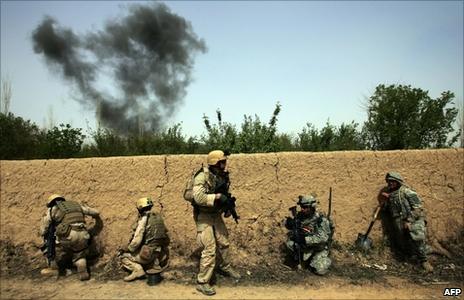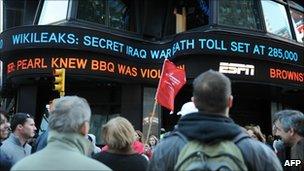Tidal wave of secret files raises new questions on Iraq
- Published

The leaked documents are by and large low-level reports from the field in Iraq
This is not so much a leak as a tidal wave of secret documents.
It dwarfs the previous disclosure by Wikileaks of US army field logs from the war in Afghanistan.
And it will take time to sift through, and to draw conclusions about just what it changes in terms of public perceptions of a conflict that is already widely seen as grim and costly.
The documents, external certainly raise new questions about the behaviour of the new Iraqi security forces, and about the US military's approach to dealing with them.
There are truly grisly reports of torture of detainees, of attacks with acid and electric drills, of beatings, and mutilations.
There is a report from as recently as December of US forces obtaining video footage of an execution of an Iraqi detainee.
Many of the documents - certainly until more recently - involve an initial report, and then include the phrase "no further investigation".
But the Pentagon has rejected the charge that it turned a blind eye.
It insists that it has acted in accordance with international law, with reports being passed to superiors and, at the appropriate level, to the Iraqis.
Unclear resonance
As with the Afghanistan documents, these are by and large low-level reports from the field.
As such, they raise as many questions as they answer.

Afghanistan, not Iraq, is the concern of the moment for most Americans
They certainly raise new questions about such issues as the level of casualties, the Pentagon's policy on counting them, and deaths at US checkpoints.
The debate raged over whether the Afghanistan leaks offered a fundamentally different picture to the public than the one that had been presented officially up till then.
Or did they just provide additional detail and ammunition to back up known issues and suspicions?
That may well be the case here. There is, for example, new fuel for already well-established suspicions of Iranian support for the insurgency.
But, in terms of reaction in the United States and elsewhere, to some extent public opinion has moved on.
Afghanistan, not Iraq, is the concern of the moment.
This leak will add to the uncertainties perhaps of what kind of country and what kind of legacy the US-led intervention has left up to now.
Just what resonance it will have, though is unclear.
The debate over the fact of the leaks, though, and its security implications or lack of them, has already been joined, as the Pentagon and the rest of the US government establishment was condemning the leaks even before they happened.
And the fact that so much more of the documents have been censored, to hide individual identities and details, is unlikely to defuse the debate over what risks such leaks pose, as well as what service they offer.